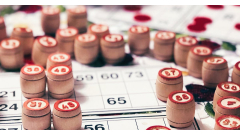Welcome to the vibrant world of Rummikub, where strategy meets excitement in a game that has captured hearts worldwide! In this Ultimate Guide to Rummikub Scoring, we delve into the rules and tips that will elevate your gameplay and turn you into a scoring expert. Whether you're a newcomer eager to learn the basics or a seasoned player looking to sharpen your skills, this guide will provide you with all the insights you need to enjoy and master this beloved tile game.
The art of Rummikub lies not just in playing the tiles but in crafting the perfect strategy to outsmart your opponents. This guide offers a comprehensive breakdown of the scoring system, strategic tips, and the intricacies of the game's mechanics. You'll discover how to maximize your points and make each play count, all while having a blast with friends and family!
Rummikub, the Original Rummy Tile Game by Pressman, is a fantastic blend of skill and chance that offers endless fun for players of all ages. Each set includes colorful tiles, allowing players to mix and match their way to victory by forming sets and runs. With simple rules and an engaging concept, Rummikub is perfect for family game nights, casual gatherings with friends, or even competitive play. As players strategize to outmaneuver their opponents and score the highest points, they develop essential thinking and planning skills—making Rummikub a game that's as enriching as it is entertaining!
Scoring Basics
In Rummikub - The Original Rummy Tile Game by Pressman, understanding scoring is crucial to mastering the game. Points are scored primarily based on the tiles players lay down and include their faces and specific combinations. Each tile has a point value, which corresponds to the number displayed on it: numbered tiles from 1 to 13 carry that same numerical value, while wild tiles are worth 30 points. Players begin by laying down sets and runs consisting of at least three tiles that are either the same number in different colors or consecutive numbers in the same color.
Throughout the course of the game, the scoring varies slightly in different rounds, especially upon laying the initial sets. To make the initial meld, players must contribute a total of 30 points from their hand. Backing up their strategy, players also want to focus on minimizing scores at the end of rounds. If a player is unable to play any tiles and must forfeit, they earn points equivalent to the total of their remaining tiles, which will be deducted from their grand total. Keeping track of these point values and devising a plan based on the tiles available is key to winning.
- Each numbered tile scores the same as its face value.
- Wild tiles have a fixed value of 30 points.
- Initial meld requires a minimum of 30 points from hand.
- Remaining tiles that cannot be played deduct points from the total.
First Move Strategy
Starting off strong in Rummikub - The Original Rummy Tile Game by Pressman not only sets the tone for your game but also can significantly boost your scoring potential right from the first turn. Focus on maximizing your points with effective tile placements and combination strategies. A clever first move can put your opponents on the back foot and make you a formidable player early on.
When considering your initial play, examine your tiles closely. Aim for a move that allows you to create multiple combinations while also meeting the requirement to use at least 30 points from your hand. Prioritizing sets (3 or 4 tiles of the same number in different colors) can be beneficial, as they often yield higher points, especially if you have high-numbered tiles in your collection. Additionally, consider making runs (consecutive numbers of the same color) as they can integrate easily with other players’ laid down tiles on subsequent turns.
- Try to maximize the use of high-value tiles early, as this can significantly impact your score.
- Keep an eye on your opponents’ tiles and try to envision how they might respond; blocking them can be an essential part of the strategy.
- If you have a wildcard, consider its strategic placement carefully. Using it can open up multiple possibilities for future moves.
Bonus Tiles Explanation
In Rummikub - The Original Rummy Tile Game by Pressman, bonus tiles play a significant role in enhancing your scoring potential. Bonus tiles are special tiles that can either be jokers or specific tiles that hold additional value in the game, such as the red and black tiles. When played strategically, these tiles can influence your overall score and provide avenues to unleash powerful combinations.
Utilizing bonus tiles effectively not only adds to your score but also impacts your opponents’ gameplay, as they may need to adjust their strategies in response. When incorporating these tiles into your tile sets, consider the following tips:
- Use joker tiles strategically to complete sets or runs when you’re just one tile short.
- Hold onto high-value bonus tiles until you can use them in the most advantageous situations.
- Pay attention to your opponents’ moves; placing bonus tiles can block their ability to meld.
- Combine bonus tiles with other tiles to maximize points when you finally lay down your combination.
End of Game Scoring
At the end of a game of Rummikub - The Original Rummy Tile Game by Pressman, scoring is crucial to determine the winner. The total points a player accumulates come from the tiles they have successfully placed on the table, and the points left from the tiles remaining in their hand. This process requires clear understanding and attention to detail to ensure accuracy in scoring.
To calculate the total points for the end of the game, follow these steps:
- First, each player should reveal their remaining tiles to all participants.
- Next, tally the points of the tiles played by the player, which include the value of their melds displayed on the table.
- Then, subtract the total point value of the tiles still in each player's hand from their overall score. Each tile has a specific point value based on its number, with number tiles ranging from 1 to 13 having their face value and joker tiles valued at 30 points.
- Any player who has successfully emptied their hand receives a bonus score of 20 points at the end of the game.
It’s important to note that the player with the highest total after all deductions is declared the winner. Ensure to keep track of the scores meticulously, as multiple rounds can lead to confusion if scores are not accurately recorded.
- Players should clarify any additional house rules regarding scoring before starting to avoid disputes.
- Encourage candor among players around their scores to maintain a fun and engaging environment.
Common Scoring Mistakes
Players often encounter pitfalls when it comes to scoring in Rummikub - The Original Rummy Tile Game by Pressman. One of the most frequent errors happens during the meld phase. Many players do not account for the initial meld requirement, which states that a player must place down a certain total value of tiles on their first turn. If this value is not reached—either by failing to use the correct combination of numbers or by miscalculating their available tiles—a player cannot legally make their first move, which can lead to missed opportunities for scoring in subsequent rounds.
Another common mistake relates to the scoring of tiles left in hand when a player goes out. Players often misjudge the value of their remaining tiles, leading to disputes about the points gained by the winner at the end of the game. For instance, it is crucial to remember that the point values are based on the numbers depicted on the tiles—1 through 13—while jokers hold a special value of 30 points. Misunderstanding these values can skew a player’s score significantly. It's essential to double-check the point totals for all remaining tiles, including any jokers, to ensure that the final score reflects accurate calculations.
- Keep a tally of your initial meld requirements to avoid delays.
- Verify the point values of all tiles both when playing and at the end of the game.
- Communicate effectively with fellow players to clarify any ambiguities regarding the value of tiles.
- Remember that jokers count as 30 points, and this can dramatically affect overall scores.
Combining Tile Sets
In Rummikub - The Original Rummy Tile Game by Pressman, combining tile sets is essential to maximize your scoring potential. The game involves utilizing numbered tiles in sets or runs to create combinations that will score points. Each combination adheres to specific rules, allowing players to be creative in their strategies. Acceptable combinations include sets of the same number in different colors and runs of consecutive numbers in the same color. For scoring, individual tiles' values align with their face value, meaning a red 7 is worth 7 points, a blue 2 is worth 2 points, and so on. Keep in mind; using your high-value tiles strategically can result in an impressive score, especially when combined effectively.
To enhance your scoring opportunities, consider these effective strategies:
- Create multiple sets or runs simultaneously to increase the number of tiles on the table, allowing for exciting gameplay.
- Save your Joker tiles for crucial plays, as they can replace any tile in a set or run and are worth 30 points when played from your hand.
- Utilize discarded tiles that other players have laid down to form new combinations, maximizing your point potential.
When executing combinations, the aim is not merely to lay down tiles but to do so in a manner that boosts your total score while remaining adaptable to changing game dynamics. This flexibility promotes creativity and can change the game's flow in your favor.
- Focus on maintaining a mix of your sets and runs to prevent stagnation in your scoring options.
- Constantly assess the remaining tiles and adapt your strategy accordingly, focusing on those that will help you complete higher-value combinations.
Scoring Variations
The game of Rummikub - The Original Rummy Tile Game by Pressman has a variety of scoring variations that players can adopt based on house rules or different game versions. One of the most popular variations is the introduction of negative points for unused tiles at the end of the game. In this variation, when a player cannot make a move or lay down all their tiles, they can incur penalties that affect their final score. This approach can significantly heighten the tension and strategy, compelling players to think strategically about not just their immediate plays, but also how to avoid accumulating unwanted tiles.
Another common variation involves adjusting how points are calculated for melds. Some groups prefer to style the game with a focus on complexity—assigning different point values for each tile based on color or number. For instance, players might decide that completed sets of three or more tiles yield higher points if they use a mix of higher-numbered tiles. These kinds of adaptations add a layer of excitement and strategy that pushes players toward forming specific combinations to maximize their scores.
- Implementing negative points for unused tiles can create a more tactical game dynamic.
- Adjusting point values based on tile complexity encourages players to remain flexible with their strategy.
- House rules may allow for additional bonuses for particular combinations, such as a joker or runs of specific colors.
Track Your Score
Keeping an accurate score during a game of Rummikub is crucial for maintaining the competitive spirit and ensuring fairness. The game inherently involves strategy and planning, and tracking your score accurately can significantly impact your tactics. One effective method for scorekeeping is to use a dedicated score sheet. You can create a simple table that includes columns for each player’s name, their current score, and the score they’ve accumulated throughout the game. A printable score sheet offers a tangible way to see your progress and can be easily adjusted as the game unfolds.
Additionally, using a mobile app to keep track of scores can streamline the process. Numerous apps are available for Rummikub that allow players to input their scores in real-time, thus reducing the chance of human error. Consider placing the score sheet or device in a central location, so everyone can see and verify the scores. This transparency helps maintain trust among players and ensures that everyone is on the same page. Here are some scorekeeping tips:
- Always update the score immediately after each player’s turn.
- Encourage discussion about score adjustments if they are necessary—this keeps players engaged.
- Consider keeping earlier rounds' scores visible for context during play.
- Regularly check in with each player to confirm that the scores are correct.
- Implement a system where players announce their scores as they play, which reinforces accountability.
- Make use of colored markers or highlighters on the score sheet to indicate large point changes, helping to visualize swing moments in the game.
Advanced Scoring Techniques
Advanced Rummikub scoring hinges on strategic tile placement and foresight into opponents' tactics. One effective method involves playing high-value tiles at the right moment. For instance, if you hold a tile valued at 12 points, consider waiting until your opponents are close to going out before placing it. This way, you maximize your tile value while potentially placing them in a position to score lower when they have no choice but to draw from the pool. This approach can shift the game's momentum in your favor, as each player's final score reflects the penalty of their unplayed tiles.
Another technique is the strategic use of joker tiles. Since jokers are wild and can represent any tile, placing them effectively can bolster your score while hindering your opponents. For example, consider using a joker to fill in a run of consecutive numbers, creating an opportunity to play additional tiles from your hand, thereby increasing your points. Stay alert to your opponents; if you notice them holding multiple tiles that could potentially complete a run or set, use your joker wisely to disrupt their plans. Timing your play of high-value tiles and strategic placement of jokers are essential for mastering advanced scoring in Rummikub.
- Hold onto high-value tiles until pivotal moments.
- Utilize joker tiles to create opportunities and block opponents.
- Anticipate opponents’ moves by monitoring their played tiles.
- Adapt your strategy based on the current game dynamics.
Scoring Etiquette
In Rummikub - The Original Rummy Tile Game by Pressman, maintaining fair play and transparency in scoring is crucial to ensure an enjoyable experience for all players. A successful game of Rummikub thrives on mutual respect and understanding among participants, making the observance of scoring etiquette vital. Players should strive to clearly announce their scores, especially when making complex moves that could alter the game's landscape significantly. This approach helps prevent misunderstandings and promotes an atmosphere of trust and camaraderie.
Engaging in best practices for clear communication can significantly enhance the overall gaming experience. Players should follow these guidelines to promote scoring etiquette:
- Always allow for open discussion regarding any scoring changes, ensuring everyone has a chance to voice concerns and ask questions.
- Encourage players to keep their own score sheets to independently verify scores and track their progress throughout the game.
- Use a communal score sheet if possible, allowing all players to see and agree on the scores in real-time.
- Review the rules of scoring at the beginning of the game, clarifying any complex scenarios that may arise.
Why We Chose This Product
I chose Rummikub for this How to Guide because it embodies the perfect blend of strategy, skill, and social interaction, making it an essential game for any gathering. It's not just about numbers and tiles; it's about engaging with friends, enjoying the thrill of competition, and creating unforgettable memories. With its straightforward rules and endless fun, Rummikub stands out as a timeless classic that brings people together.
- Easy to learn and suitable for all ages
- Promotes critical thinking and strategic planning
- Encourages social interaction and friendly competition
- Offers endless replayability with different game dynamics
This guide is designed to enhance your experience with Rummikub, allowing you to enjoy the game even more and engage with fellow players like never before. Dive in, soak up the tips, and get ready to ace your next game!
Rummikub, the Original Rummy Tile Game by Pressman, is a fantastic blend of skill and chance that offers endless fun for players of all ages. Each set includes colorful tiles, allowing players to mix and match their way to victory by forming sets and runs. With simple rules and an engaging concept, Rummikub is perfect for family game nights, casual gatherings with friends, or even competitive play. As players strategize to outmaneuver their opponents and score the highest points, they develop essential thinking and planning skills—making Rummikub a game that's as enriching as it is entertaining!










